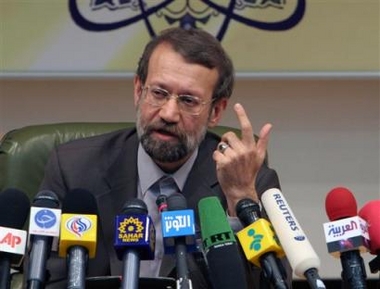Iran ratcheted up its defiance ahead of a U.N. Security Council deadline to
suspend uranium enrichment, threatening Tuesday to hide its program if the West
takes "harsh measures" and to transfer nuclear technology to chaos-ridden Sudan.

Iran's top nuclear
negotiator Ali Larijani, who is also Iran's Sercretary of Supreme National
Security Council, delivers a speech at a conference on Iran's nuclear
activities in Tehran, Iran, Tuesday, April 25, 2006. Larijani said Tuesday
that Iran will withdraw from all cooperation with the U.N. nuclear
watchdog agency if the U.N. Security Council imposes sanctions against it.
[AP] |
Ali Larijani, the top Iranian nuclear negotiator, also renewed a vow to end
cooperation with the U.N. nuclear watchdog agency and said increasing pressure
on Iran would only stiffen its resolve.
"If you take harsh measures, we will hide this program. If you use the
language of force, you should not expect us to act transparently," Larijani
said, adding that Western nations "have to understand they cannot resolve this
issue through force."
Secretary of State Condoleezza Rice fired back almost immediately, saying,
"Iranians can threaten, but they are deepening their own isolation."
Top leader Ayatollah Ali Khamenei made the offer to transfer nuclear
technology at a meeting Tuesday with Sudanese President Omar al-Bashir.
"Iran's nuclear capability is one example of various scientific capabilities
in the country. ... The Islamic Republic of Iran is prepared to transfer the
experience, knowledge and technology of its scientists," Khamenei told
al-Bashir.
Al-Bashir said last month that his impoverished, violence-ridden country was
considering a nuclear program to generate electricity.
Such a technology transfer would be legal as long as it is between signatory
states to the nuclear nonproliferation treaty, and the International Atomic
Energy Agency is informed.
We "have to be concerned when there are statements from Iran that Iran would
not only have this technology, but would share it, share technology and
expertise," Rice told reporters during a visit to Ankara, Turkey.
Russia, meanwhile, launched a satellite Tuesday for Israel that the Israelis
say will be used to spy on Iran's nuclear program. The satellite is designed to
spot small images on the ground and would allow Israel to monitor Iran's nuclear
program and long-range missiles, an Israel defense official said.
With the U.N. deadline approaching Friday, Iran has become more defiant
almost daily.
"If U.N. Security Council sanctions are to be imposed on Iran, we will
definitely suspend our cooperation with the International Atomic Energy Agency,"
Larijani said, echoing the words of hard-line President Mahmoud Ahmadinejad a
day earlier.
Iran's stance appeared to stem in part from opposition to sanctions by Russia
and China, both veto-holding members of the Security Council.
"We see no alternative to the negotiations process," Russian Defense Minister
Sergei Ivanov said. And Chinese Foreign Ministry spokesman Qin Gang urged all
parties "to show flexibility."
The United States has not openly threatened military action and says it wants
a diplomatic solution. But President Bush has said all options, including
military force, remain on the table.
Britain also warned Iran against miscalculating.
"The Iranians, in my judgment, would miscalculate if they believed Russia or
China would block appropriate and effective sanctions, which targeted the
regime, not the ordinary population," Foreign Secretary Jack Straw said.
Iran's tough talk appeared to be the strongest public show so far ahead of
the Security Council deadline to suspend uranium enrichment, a process that can
produce fuel for nuclear reactors or for warheads.
On Monday, Ahmadinejad boldly predicted the council would not impose
sanctions and warned Iran was considering dropping out of the Nuclear
Nonproliferation Treaty.
Larijani emphasized that stance Tuesday, saying Iran would ignore the demand.
"If you take the first step wrong, the wrong trend will continue. We welcome
any logical proposal to resolve the issue. They just need to say why should we
suspend," he said.
The IAEA said it would not issue any public statements ahead of director
Mohamed ElBaradei's report to the Security Council and the agency's board,
expected by week's end.
The United States and European allies are expected to press for binding
measures against Iran when the Security Council begins the next round of review
of the Iranian case.
Although Rice has raised the likelihood of pressing for sanctions, she did
not go that far Tuesday, saying only that the Security Council must issue
something more concrete than last month's "presidential statement," which gave
Iran 30 days to comply.
Larijani said sanctions might force Iran to speed up its nuclear programs.
"You can't set a framework through coercion. If you try to do it by force, our
response will be to break such a framework," he said.
The United States, Britain and France suspect Iran is seeking to make nuclear
weapons. Iran denies that, saying its nuclear program is intended to generate
electricity.
Western concerns have built since 2002 when Iran was found to have secretly
operated large-scale nuclear activities for two decades.
The IAEA says it has since found no direct evidence of an arms program, but
the Iranians have not been fully forthcoming.
After repeated attempts at negotiations, the IAEA reported Iran to the
Security Council for noncompliance. The council then gave Iran until Friday to
suspend enrichment.